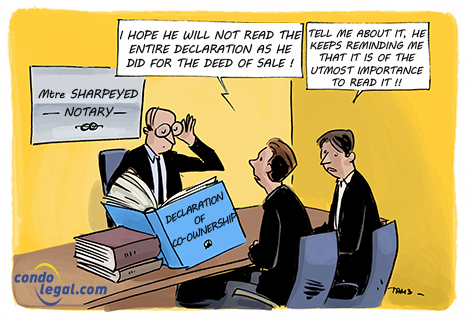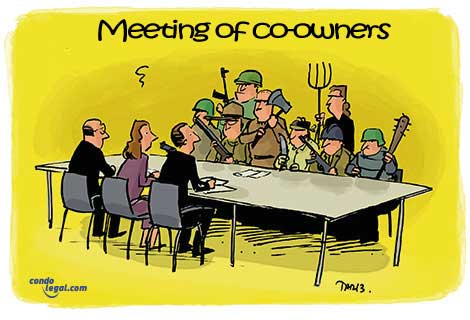Procedures for calling a meeting of the co-owners

Co-owners must be called at least once a year to a meeting known as an annual meeting. This assembly, like all other types of assembly, must bring together all the co-owners. With the notice calling the meeting, the board of directors notifies all the co-owners of the list of points to be studied and decisions to be voted on at the meeting of co-owners. This document is the agenda of the assembly. The summons has to respect a procedural frame, otherwise the assembly of the co-owners could be irregular. That is why it is up to the one who takes the initaive to summon her to respect rules
Who calls the meeting?
In theory, the Board of Directors (the Board) convenes the general meeting of co-owners. But in some cases, one or more co-owners can on his own initiative convene it:
- When the interim director fails to convene the special transitional meeting (Article 1104 of the Civil Code of Québec).This meeting must be convened within 90 days of the loss of the majority of the votes (by the developer) at the General Meeting;
-
When one or more co-owners (representing at least 10% of the votes of all co-owners) request that a general meeting be held, and the board does not respond within 21 days from the receipt of the request. Take note that this request must be sufficiently specific to enable drafting of a notice of the meeting and a duly drafted agenda. Also unless the general meeting decides otherwise, the co-owner who convened the meeting is entitled to require to be reimbursed for expenses incurred for this purpose (Article 352 of the Civil Code of Québec).
In addition, in the event of the death of a co-owner, the notices of meetings and minutes of the meetings of the co-owners must be sent by the board of directors to the domicile of the deceased as long as the transfer of ownership has not been notified to him. After notification, these documents must no longer be sent to the address of the deceased but to the heirs, failing which the latter may request the annulment of the decisions taken at the meeting.
To whom the notice must be sent?
The notice must be communicated at the addresses listed in the register of the syndicate
In addition, in the event of the death of a co-owner, the notices of meeting and the minutes of the meetings of the co-owners and the meetings of the board of directors must be sent by the board of directors to:
- the mailing address and to the attention of the deceased as the syndicate has not been notified of a transfer of ownership of the co-ownership fraction (e.g. an apartment);
- to the liquidator when the syndicate has been notified of the publication in the land register (on the fraction that belonged to the deceased) of a declaration of transmission at the end of which the liquidator retains the succession seizure;
- to the heir or legatee where the syndicate has been notified of the publication of a declaration of transmission for the purpose of delivering the property to one of them.
How to send the notice of call?
Usually, the declaration of co-ownership indicates how to send the notice of meeting. If there is no such provision, the Law does not provide for any default provisions. In any case, to legally convene the meeting, the directors of the co-ownership must ascertain that they have convened all owners. Therefore it is appropriate to opt for the means of transmission to prove the reception, namely:
- The delivery by hand, together with an acknowledgment of receipt by the co-owner;
- Sending the notice by e-mail with acknowledgement and mention of the date of receipt;
- Sending the notice by registered mail with an acknowledgment of receipt.
In this regard, it is generally stated in the declaration of co-ownership that when the notice of meeting is sent by registered mail, it is validly transmitted even if the recipient refuses or neglects to take delivery.
Time frame to call a meeting
The By-laws of the immovable generally specifies the deadlines for convening meetings of the co-owners. We often find in recent declarations of co-ownership the same deadlines for convening as those provided by law, and this without making a distinction between annual meetings and special meetings. In this regard, article 346 of the Civil Code of Québec states that the notice of the convocation of the annual meeting must be communicated, to each co-owner, at least 10 days before the holding of the annual meeting, but not more than 45 days before. On the other hand, there is nothing to prevent the By-laws of the immovable from providing for a longer minimum period, 15 days for example.
This period may nevertheless be shortened by the Board of directors in the event of extreme urgency, for example if a major disaster occurs in the building. Declarations of co-ownership usually provide that in case of emergency a period of 3 days is sufficient. In such circumstances, the Board of directors will have to justify the urgency of holding the meeting.
Date, time and location
The general meeting of the co-owners must be held on the date, at the time and in the location determined in the notice of meeting sent to the co-owners. It is generally held in the city were the co-ownership is located, unless the by-laws of the immovable specify another location.
The date and time of the general meeting must be carefully chosen, to optimize participation of the co-owners. Insofar as the venue, the meeting room must be large enough to accommodate all participants. Ideally, the latter should be accessed from the immovable or be located nearby, to encourage a larger number of persons to be present.
How to transmit
As for the mode of transmission of the notice calling the meeting, nothing is specified in the law. However, the declaration of co-ownership usually sets certain requirements, for example, for the older ones, registered post, hand-to-hand hand delivery, etc. If the declaration of co-ownership does not prohibit it, which is rather rare, the transmission of the notice calling the meeting can be done by any technological means, for example by e-mail. However, the technology chosen will have to meet the provisions of the Act to establish a legal framework for information technology.
 WHAT YOU SHOULD KNOW! If they are all present or represented at a general meeting, the co-owners may waive the notice of meeting. In fact, not challenging the conformity of a notice is tantamount to a renunciation to it. This administrative tolerance is very useful in small co- ownerships, in which more often than not the owners communicate with each other and gather informally. However, this approach may not be effective in a large co-ownership projects, which is reason enough to sending a proper notice of meeting.
WHAT YOU SHOULD KNOW! If they are all present or represented at a general meeting, the co-owners may waive the notice of meeting. In fact, not challenging the conformity of a notice is tantamount to a renunciation to it. This administrative tolerance is very useful in small co- ownerships, in which more often than not the owners communicate with each other and gather informally. However, this approach may not be effective in a large co-ownership projects, which is reason enough to sending a proper notice of meeting.
 WHAT TO KEEP IN MIND: All owners (without exception) must be called to the meeting, even those who are deprived of their voting rights. Failing calling all concerned, the decisions taken during a general meeting could be challenged by any co-owner, who could argue that the meeting convening process has not complied with all rules.
WHAT TO KEEP IN MIND: All owners (without exception) must be called to the meeting, even those who are deprived of their voting rights. Failing calling all concerned, the decisions taken during a general meeting could be challenged by any co-owner, who could argue that the meeting convening process has not complied with all rules.
 WARNING! Postal voting is not allowed in co-ownership. It cannot replace holding a general meeting or the signing of a written resolution by all co-owners.
WARNING! Postal voting is not allowed in co-ownership. It cannot replace holding a general meeting or the signing of a written resolution by all co-owners.
 CONSULT A TEMPLATE FOR A Notice template of meeting
CONSULT A TEMPLATE FOR A Notice template of meeting
 CONSULT A TEMPLATE FOR A Request for the convocation of a special meeting by one or more co-owners (template)
CONSULT A TEMPLATE FOR A Request for the convocation of a special meeting by one or more co-owners (template)
Back to the mega-factsheet Calling the general meeting



